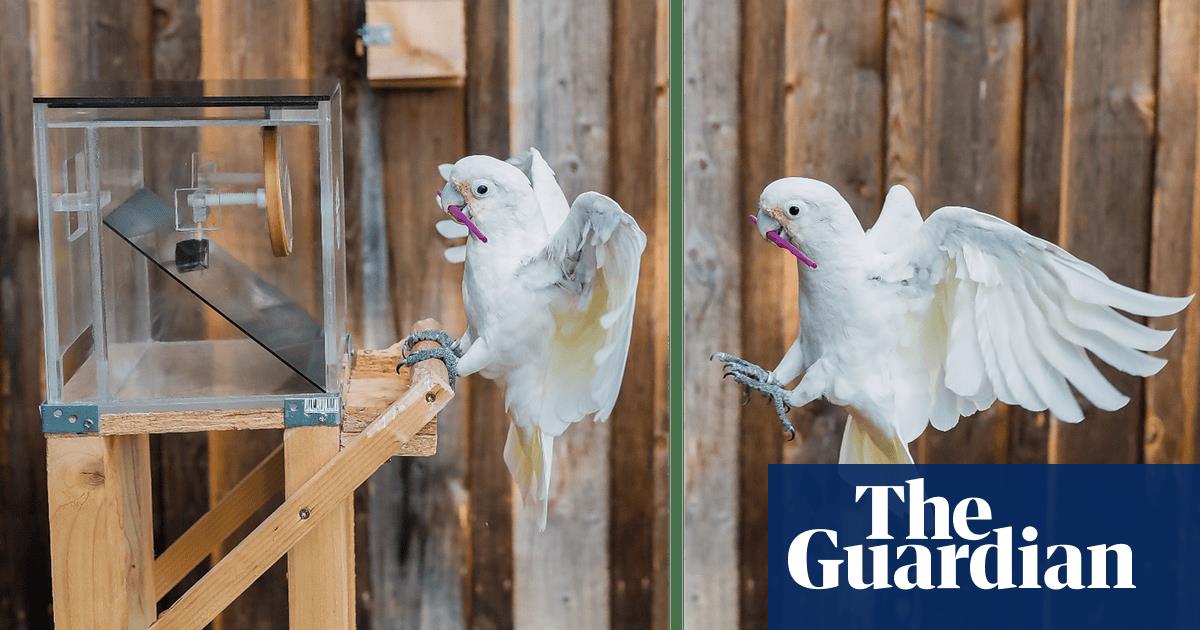
They might not have a toolbox or even a fancy belt, but it appears Goffin’s cockatoos are the Handy Andy of the bird world. Researchers have revealed the parrots are able to figure out how to use sets of tools, select the best instrument for a job and even transport tools together before attempting to use them.
While New Caledonian crows have long been hailed as expert tool users, recent research shows that Goffin’s cockatoos are also proficient at creating instruments and using them, with one study describing how wild birds manufactured and used three types of tools as “cutlery” to extract seeds from tropical fruit.
Besides Goffin’s cockatoos, researchers say the only other non-human species known to use toolsets in the wild are chimpanzees.
But Dr Antonio Osuna-Mascaró, the first author of the research from the University of Veterinary Medicine in Vienna, said it was previously unclear whether the birds were only turning to a second tool once the first proved to be no longer useful.
“Something that looks like a toolset can be nothing more than a chain of single tool uses,” he said, noting there had previously been similar debate around tool set use in chimpanzees.
Now, it seems, the question has been settled. “A toolset for a cockatoo is more than the sum of its parts,” said Osuna-Mascaró.
Writing in the journal Current Biology, Osuna-Mascaró and colleagues describe how they presented each bird with a box containing a cashew nut that could only be accessed using two different tools: a rigid stick to pierce and tear a membrane between a window and the nut, and a longer, flexible tool to fish the nut out.
Of the 10 cockatoos presented with the task, seven figured out the need to use both tools, with two solving the task on their first trial.
Six birds completed nine consecutive successful trials across three consecutive days, five of which moved on to a second experiment in which the birds were presented at random with a box requiring either one or two tools to access a nut inside. Crucially, while both tools were available, the first tool required depended on the box.
The results revealed that in 128 out of 150 attempts in total, the birds used the correct tool first.
The team says the findings provide the first controlled evidence that most Goffin’s cockatoos spontaneously begin to use a novel toolset, without help from others, and learned to apply it as needed for the task in front of them.
In a final experiment, the five birds were again presented at random with one of the two boxes. However, this time the box was on a platform, with the two tools placed on a table, meaning the birds had to collect them before climbing a ladder or flying to the box.
Four of the five birds eventually carried the tools together, and three began frequently doing so. However, two of these birds did so less frequently when faced with the box requiring just one tool.
The researchers say the discovery shows the cockatoos viewed the tools as a set. “If you bring always both tools together, you are not going to fail [to get the nut],” said Osuna-Mascaró. “You have to do the extra effort of transporting one [extra tool], but if you’re strong enough, you don’t care.”
Prof Alex Kacelnik, an expert in behavioural ecology at the University of Oxford who was not involved in the study, described the research as exciting, saying it adds substantially to what we know about behavioural abilities of other species.
“I would place this discovery on a par with New Caledonian crows’ ability to make compound tools – they make longer compound poles by combining shorter ones together when this is required,” he said.
“What this reveals is that our fellow species have many competences that we are just starting to uncover.”












